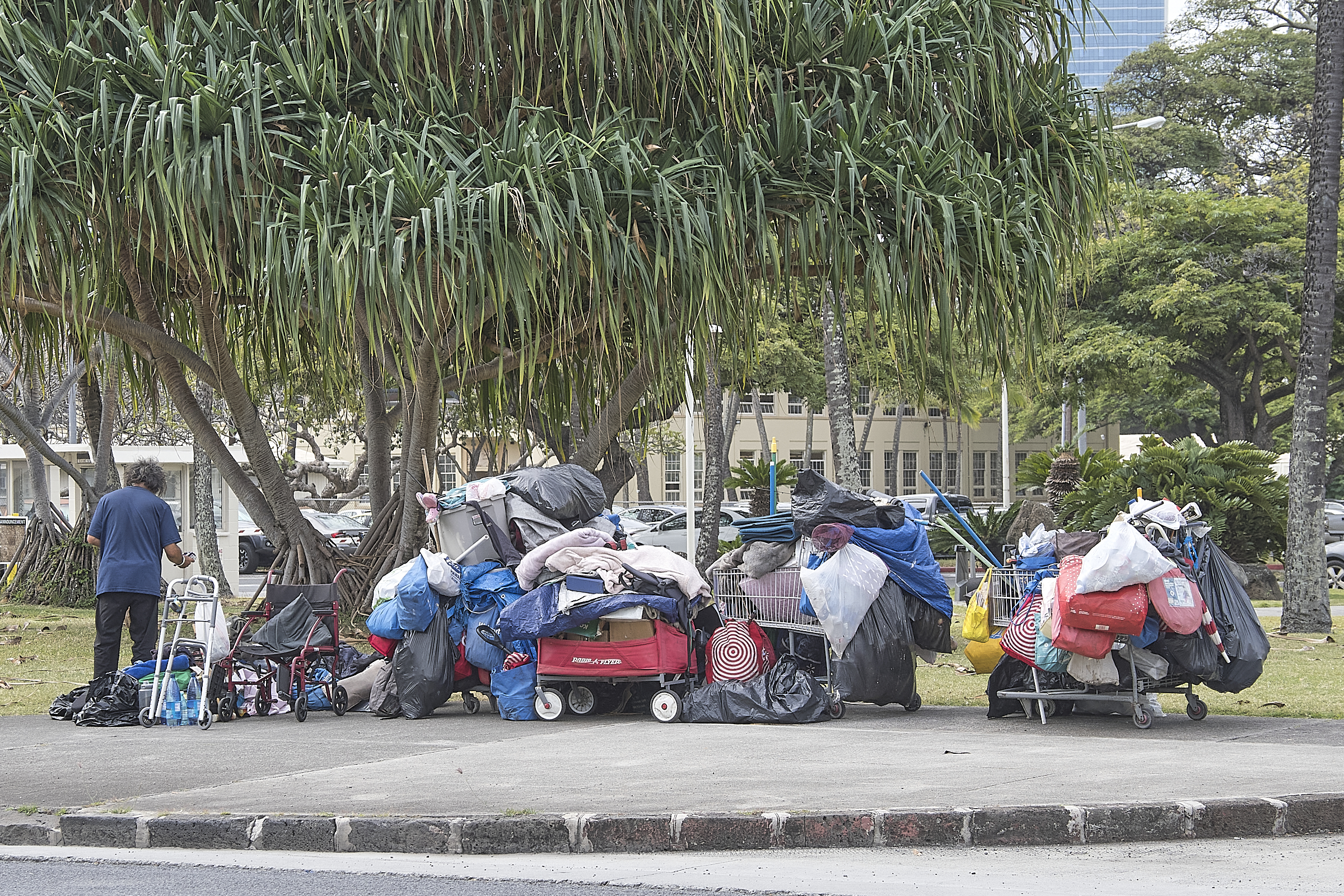Kirstin Downey: Honolulu Mayor Lobbies For More Federal Money For City's Homeless Problem
Rick Blangiardi was one of about 50 mayors to descend on Washington, D.C., this week.
May 2, 2024 · 7 min read

About the Author
A Kailua girl, Kirstin Downey was a reporter for Civil Beat. A long-time reporter for The Washington Post, she is the author of “The Woman Behind the New Deal,” “Isabella the Warrior Queen” and an upcoming biography of King Kaumualii of Kauai. You can reach her by email at kdowney@civilbeat.org.
Rick Blangiardi was one of about 50 mayors to descend on Washington, D.C., this week.
Editor’s note: Kirstin Downey, a longtime Civil Beat reporter, has transitioned to a new job as a regular columnist with a focus on Hawaii history and culture as well as local issues that are playing out in Washington, D.C., where she is finishing work on a new book about Kauai’s chief, King Kaumualii, who reigned in the early 1800s. For this column, she spent some time with Honolulu Mayor Rick Blangiardi, who was in the nation’s capital to meet with federal officials.
Confronting an intractable homelessness crisis, dozens of America’s mayors streamed into Washington, D.C., this week, seeking more and better help from lawmakers and officials in addressing it.
They are asking the federal government to develop a comprehensive national strategy to deal with homelessness.
Honolulu Mayor Rick Blangiardi, running for reelection in November, was among them, seeing the five-day visit as an opportunity to flag an issue that he called a source of persistent concern and unease to his constituents.
“We’re providing a voice, a primal scream, about the needs of our communities,” he said.
The trip was organized by Los Angeles Mayor Karen Bass, Blangiardi said in an interview in Washington this week. Los Angeles had 46,000 homeless in 2023, up from 42,000 a year earlier, a 9.5% rise. Honolulu had 4,028 homeless in 2023, up 2% from 2022.
Nationwide, some 653,000 people were homeless last year, up 12.1% from 2022, according to the U.S. Department of Housing and Urban Development.
The rising cost of housing all over the country, compounded by high interest rates that make it harder for renters to transition into home ownership, are complicating everyone’s efforts, Blangiardi said.
Even middle-income people across the country are facing pressure from high housing costs, including in formerly low-cost cities like Phoenix.

‘A Show of Force’
The 50 other mayors active on the homelessness task force include Sheng Tao of Oakland and Rex Richardson of Long Beach, Jacob Frey of Minneapolis, Andre Dickens of Atlanta, Wade Kapszukiewicz of Toledo, Ohio, Esther Manheimer of Asheville, N.C., John Whitmore of Houston, David Hoit of Oklahoma City, Paige Cognetti of Scranton, Pa., and Edward Gainey of Pittsburgh.
“We wanted to come here with a show of force,” Blangiardi said. “Municipalities big and small are dealing with a lack of affordable housing, the increase in homelessness and a lack of resources, especially to deal with mental illness.”
The mayors met with Tom Perez, a senior advisor to President Joe Biden, and officials at the Department of Housing and Urban Development and Health and Human Services. On Capitol Hill, they spoke with more than 20 lawmakers, including Democratic Rep. Rosa DeLauro, ranking member of the House Appropriations Committee, and Republican House Majority Leader Rep. Steve Scalise.
Blangiardi also met with Hawaii’s U.S. Sens. Brian Schatz and Mazie Hirono.
He said the mayors are first pushing for three specific things they think could help — more money for housing vouchers for individuals and projects that accept vouchers, but also for rule changes that will make it easier to provide assistance to veterans who are homeless or at risk of becoming homeless.
“We want to make sure if they are giving out money, Honolulu is not at the back of the line.”
Mayor Rick Blangiardi
Housing vouchers are a government subsidy toward rent payments, with the renter paying the portion he or she is calculated to be able to afford each month and the federal government paying the rest. The program is intended to help elderly and disabled people and those with very low incomes obtain and retain affordable housing. They keep the poorest people from slipping into homelessness.
Honolulu has funding for 3,980 housing vouchers but Blangiardi hopes to secure 6,000 vouchers.
At least 15,000 households in Honolulu would qualify for housing vouchers if the money were available, Blangiardi said, based on statistics compiled through the city’s rent and utility relief program.
Supreme Court Ruling Looms
Blangiardi’s visit came just days after oral arguments were held in a U.S. Supreme Court case that may change the way some communities handle their homeless populations.
On April 22, the nine justices deliberated over a contentious case involving Grants Pass, a small town in Oregon. The town had fined homeless people for sleeping in outdoor spaces. Advocates for the homeless sued and won, saying the city’s policy effectively made it a crime to be homeless.
The 9th U.S. Circuit Court of Appeals had previously ruled that the Eighth Amendment’s ban on cruel and unusual punishment prohibits placing criminal penalties on people who are homeless and do not have access to shelter.

Dozens of cities and counties, including many on the West Coast, have rallied behind Grants Pass officials, saying that courts have gone too far in preventing them from being able to regulate problematic behavior, and that that’s effectively tied their hands.
But many homeless advocates fear a new judicial ruling could lead to cities imposing penalties on people whose only crime is being poor. Hundreds of people rallied outside the Supreme Court building the day that the opposing lawyers made their presentations to the justices.
Hawaii has not taken an official stand on the case, according to Toni Schwartz, a spokeswoman for the Attorney General’s office.
“The Department will analyze the Supreme Court decision when it is released,” she said in an email.
‘We Want to Help Them’
The city has also intervened in the case. Blangiardi said that while he does not believe in “criminalizing homelessness,” he thinks that a judicial ruling more favorable to government action could be advantageous if it gave officials more flexibility.
“That’s what we are hoping for,” he said. “With people who can’t make a decision for themselves, we could take them in, treat them. There are people lying in the street. We want to help them.”
He said he would also like to be able to do more when elderly people are threatened by aggressive homeless people.
“People shouldn’t feel afraid,” he said.
He said the city is already taking many steps that he is hopeful are helping ameliorate the situation. About half the city’s 2023 homeless are now in shelters of some kind, he said, including most women with children.
In addition, the city has expanded its Crisis, Outreach, Response and Engagement program, in which specialized emergency teams address the medical and social needs of homeless people. It has 36 employees now, up from 15 in 2021. The city and state are working together to increase the number of kauhale, or tiny house villages. And city officials are moving to secure more housing locations.
But more money from the federal government is essential, Blangiardi said. He said that the mayors were received cordially this week and given some reason for optimism that more funds may be forthcoming.
“They keep using the word ‘bipartisan,’” he said. “They say this is an issue they can work across the aisle on. We want to make sure if they are giving out money, Honolulu is not at the back of the line.”
 Sign up for our FREE morning newsletter and face each day more informed.
Sign up for our FREE morning newsletter and face each day more informed.
Read this next:
Maui Mayor Takes 'Bold Step' To Eliminate 7,000 Short-Term Rentals By 2026
By Cammy Clark · May 2, 2024 · 9 min read
Local reporting when you need it most
Support timely, accurate, independent journalism.
Honolulu Civil Beat is a nonprofit organization, and your donation helps us produce local reporting that serves all of Hawaii.
ContributeAbout the Author
A Kailua girl, Kirstin Downey was a reporter for Civil Beat. A long-time reporter for The Washington Post, she is the author of “The Woman Behind the New Deal,” “Isabella the Warrior Queen” and an upcoming biography of King Kaumualii of Kauai. You can reach her by email at kdowney@civilbeat.org.
Latest Comments (0)
I believe our homeless count is woefully low and continues to build with a cadre of migrant homeless filtering into the state on cheap airfares. Witness it for yourself on the slopes of Diamond Head, some locals, many non. Hawaii is a paradise to all, especially if you've survived freezing winters or triple digit summers on the mainland. The city has taken a soft stance for decades and the problem continues to get worse. Let's hope the court's ruling helps with enforcement of rules and law, that the rest of us observe. It's a false narrative to state government is "imposing penalties on people whose only crime is being poor." There's theft, camping in parks, beaches, state and Federal lands, trespassing, assault and many other crimes that go unpunished until they become severe and someone is hurt (acid). But at this point, isn't it already too late? It's time we take our city back. Time for strict enforcement, detention centers where help is administered as a prison prevention measure, retraining centers and temporary housing via mobile homes, but what's happening now needs to end and a new strategy implemented.
wailani1961 · 2 months ago
Hawaii is economically segregated. The rich get richer, the homeless numbers keep increasing, and the middle/working class is moving away. Soon Hawaii will have only polarized extremes -- the rich living in their protected neighborhoods, and the homeless pushed into poor/Hawaiian/immigrant neighborhoods where politicians can forget about them. Problem solved!
BennyR · 2 months ago
Where's,all the allocated money that never seems to make a dent to begin with. Time for an audit!
Maluhia8 · 2 months ago
About IDEAS
IDEAS is the place you'll find essays, analysis and opinion on every aspect of life and public affairs in Hawaii. We want to showcase smart ideas about the future of Hawaii, from the state's sharpest thinkers, to stretch our collective thinking about a problem or an issue. Email news@civilbeat.org to submit an idea.

